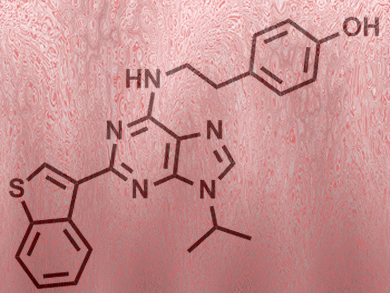Acute myeloid leukemia (AML), one of the most aggressive forms of blood cancer, is characterized by the rapid growth of abnormal white blood cells. The current therapies mostly fail to eradicate this disease as they do not kill leukemic stem cells, a population of malignant blood cells from which leukemia originates. The development of drugs targeting leukemic stem cells, however, is challenging because these cells differentiate when put into in vitro cultures.
Guy Sauvageau, University of Montreal, Canada, and co-workers demonstrated that human leukemic stem cells do not differentiate in in vitro cultures in the presence of UM729, a pyrimidol indole, and SR1 (StemReginin 1; pictured), an antagonist of the transcriptional factor aryl hydrocarbon receptor. Thus, leukemic stem cells of AML patients can be grown and proliferate in vitro in the presence of UM729 and SR1.
This discovery is very important for the study of the mechanisms that regulate the proliferation of leukemic stem cells and, therefore, it will pave the way for the development of novel antileukemic drugs.
- Identification of small molecules that support human leukemia stem cell activity ex vivo,
Caroline Pabst, Jana Krosl, Iman Fares, Geneviève Boucher, Réjean Ruel, Anne Marinier, Sébastien Lemieux, Josée Hébert, Guy Sauvageau,
Nat. Methods 2014.
DOI: 10.1038/nmeth.2847



